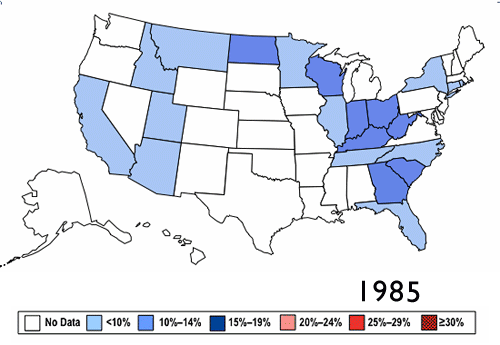In 1985 in the United States, there were only eight states where more than 10 percent of adults were obese. By 2001, not a single state had prevalence below 15 percent. The map below shows how obesity has increased in the United States from 1985 to 2007.
"Decoding Diabetes," in the current issue of Harvard Magazine, highlights new research by Harvard scientists on the causes of, and potential for treating and curing, type 2 diabetes—a disease for which obesity is the most powerful risk factor. To find out if you are at risk for diabetes, calculate your body mass index on the National Institutes of Health website, then take a quiz to assess your risk level on the website of the Harvard-affiliated Joslin Diabetes Center.
The "Virtual Wok" feature, on the webpage for the Joslin's Asian American Diabetes Initiative, lets you design your own meal and analyze its nutritional content (calories, fat, fiber, protein).
Among the researchers featured in "Decoding Diabetes" are Gökhan Hotamisligil, of the Harvard School of Public Health, and David Ludwig, of Harvard Medical School and Children's Hospital Boston. Click here to listen to an interview with Hotamisligil, in which he discusses a new category of hormones recently discovered in his lab. (The podcast is hosted by the journal Cell, which published Hotamisligil's research findings in September.) Click here to listen to an interview with Ludwig, in which he discusses the threat—and underlying causes—of childhood obesity in the United States. (This clip is hosted by the New England Journal of Medicine, which published Ludwig's article on the subject in December 2007.) In this interview, Ludwig also describes the components of a low-glycemic diet—one that has a minimal impact on blood sugar, and which his research has shown helps some people lose weight much more effectively than other diets.
Ludwig's research group is currently enrolling participants for several diet and nutrition studies, including one that promises participants will lose more than 10 percent of their body weight in three to four months. (The study aims to assess the weight-loss potential, and other physiological effects, of various diets; participants must be overweight or obese at the beginning of the study.) Visit the Optimal Weight for Life Research Group website find out whether you qualify.










